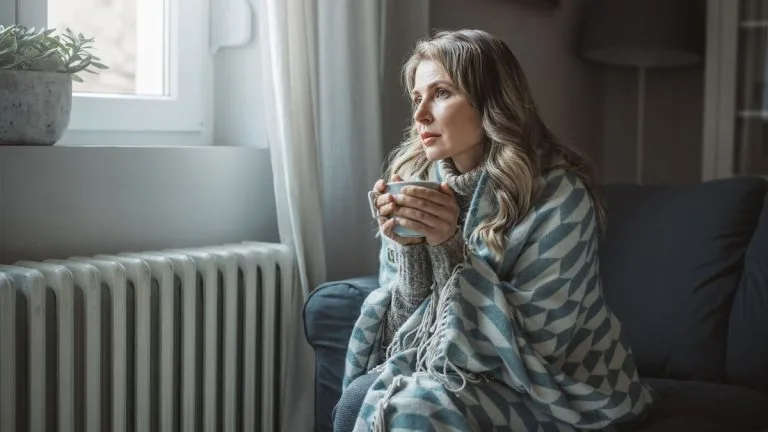There are many occasions when we talk to you about the multiple symptoms that can occur during menopause. Women face several symptoms that may appear during this critical period. Mood swings, bone problems, vaginal dryness… and the dreaded hot flashes. They are, perhaps, one of the most commented symptoms by many women, who see how suddenly, sudden heat Which makes them sweat. But maybe you haven’t heard of other specific types; Cold flashes, a less visible ailment suffered by many women in the menopausal transition.
What are cold flashes?
“Cold flashes are one Temporary sensation of tingling, chills and chills That can occur suddenly in the body and that leaving an uneasy feeling. Despite being a less frequent symptom and much less studied than common hot flashes, they are not a symptom that should be underestimated, since in some studies, up to one 29% are female “They indicate that they suffer from this discomfort,” he explains. Miria RocaDoma Co-Founder and Menopause Expert.
This is not a symptom that should be underestimated, since in some investigations, up to 29% of women have indicated that they suffer from this discomfort.
Why do they happen?
Doma’s team points to the existence of two possible explanations for cold flashes.
- On the one hand, again they are blaming hormones. Estrogen levels decrease during menopause, Due to which the hypothalamus (body temperature control center) becomes more sensitive to small changes in body temperature. How does it work? Overreact to these and cause temperature changes, leading to those hot or cold flushes.
- On the other hand, it has also been observed that after a hot flash, many women experience this “cool” feeling because of the hot flash Blood vessels near the surface of the skin are dilated Try to get rid of the heat and once this happens, the body temperature drops very quickly. Sensation of cold presence.
Hot flashes are also a problem in the colder months
Because of its relationship to heat, hot flashes seem to be a problem that gets worse in the summer. But the truth is that even in the colder months they can become an unwelcome companion. “In the winter it may seem like hot flashes aren’t a problem, but they really are, because when the hot flashes are over, Sudden changes in temperature What the woman feels leaves her with a strong sensation of cold and even chills. And, besides, he’s often drenched in sweat, which still makes him Feeling more discouragedEspecially at night because of these night sweats,” adds Roca.
Fluctuations between cold and heat are very common in a woman’s daily life during the climacteric period.
Going from cold to hot, an unpleasant sensation
It is important to remember that this fluctuation between cold and heat is very common in a woman’s daily life during climacteric, which makes it extremely difficult for her to find a solution. Sensation of thermal comfortThat can affect a woman’s quality of life, who can go from wearing a woolen jacket to a short-sleeved T-shirt the moment a hot flash appears. “During menopause, a woman may feel that the temperature in the office or at home is adequate. After a while, A sudden feeling of warmth and open the window. then cooling down, Overdressed and sweating again. Then, the cold comes again… This is obviously not a comfortable situation, but can be alleviated with appropriate treatment,” adds Roca. Of course, apart from menopause, the perception of cold and heat is not the same for all women and depends on other factors – body weight, diet, lifestyle, drugs, other pathologies… -.
What are the solutions for hot flashes?
We have to try to find a solution. In this sense, menopause experts emphasize that these discomforts due to menopause can be alleviated specific treatment For women in the menopausal transition that provides adaptogens and essential nutrients to regulate the hormonal fluctuations of menopause. Also, “foods that contain phytoestrogens and other substances that act as natural hormones, such as hemp seeds, peas, soybeans, bananas, etc. are very beneficial during this phase,” says Cristina Martinez, co-founder of Doma. It is recommended to ask our gynecologist about the options that would be best for our particular case.


